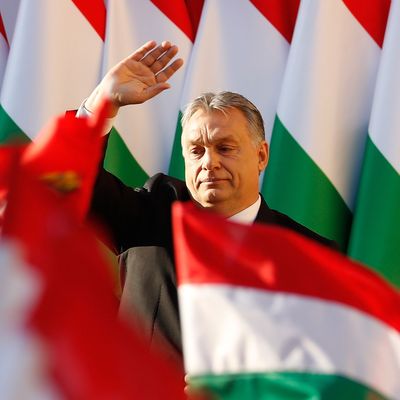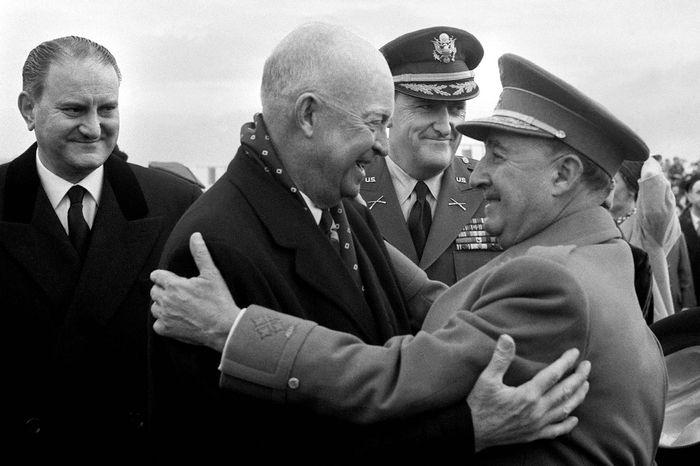
Donald Trump has focused a lot of his energies lately on endorsing 2022 candidates for office, particularly in disputed Republican primaries in which he can create a Trumpier-than-thou competition or settle old grudges with past detractors. It sometimes seems not a sparrow falls to the ground in GOP politics without the 45th president viewing the development narcissistically and interpreting it in terms of his own preoccupations.
But Trump’s latest endorsement Monday shows him reaching pretty far:
Viktor Orbán of Hungary truly loves his Country and wants safety for his people. He has done a powerful and wonderful job in protecting Hungary, stopping illegal immigration, creating jobs, trade, and should be allowed to continue to do so in the upcoming Election. He is a strong leader and respected by all. He has my Complete support and Endorsement for reelection as Prime Minister!
Given Trump’s well-known affinity for political strongmen, this may seem like a dog-bites-Hungarian story. But viewed historically, it’s very unusual, to put it mildly. Sure, presidents make nice with other heads of state in furtherance of foreign-policy interests and as a matter of diplomatic protocol, as do former presidents and future presidential aspirants. And in the Cold War era, U.S. leaders often snuggled up to evil people who shared their antipathy toward communists. President Dwight D. Eisenhower, who had headed up the allied war effort in World War II, got buddy-buddy with Spain’s Francisco Franco, who not only killed an awful lot of innocent people and enslaved many more but also sent troops (allegedly “volunteers”) to fight for Hitler on the Eastern Front.
Anti-communist solidarity was the ostensible reason for chumminess between the Nixon and Ford administrations and Chile’s murderous dictator Augusto Pinochet as well as Reagan’s stubborn support for the apartheid regime in South Africa. In the latter case, Reagan may also have been currying favor with the southern white racists he was luring into the GOP at the time. That’s another rationale for American elected officials picking favorites in other countries’ political battles: a desire to pander to domestic constituencies. For many years, pols in northeastern cities were tutored to express love for the “three I’s” — Ireland, Italy, and Israel.
Occasionally, U.S. leaders have such an obvious ideological and temperamental kinship with a particular foreign leader (e.g., Reagan with Margaret Thatcher or Bill Clinton with Tony Blair) they can be described as strong political allies. That may largely explain Trump’s much-professed affection for Brazil’s Jair Bolsonaro, a similarly fiery and erratic cult-of-personality figure who will almost certainly be the next foreign beneficiary of an explicit Trump endorsement. But in Orbán’s case, the scary thing is that Trump’s admiration of the Hungarian apostle of “illiberal democracy” is most clearly aspirational. As my colleague Jonathan Chait put it a couple of years ago, Orbán is what Trump dreams to become.
Like Trump, Orbán came to power democratically, and his regime still holds elections. But the Hungarian leader is a wizard at giving himself authoritarian powers that distort democracy into something very dissimilar, much like the “heads, I win; tails, you lose” system Trump transparently favors where his manifest greatness cannot be legitimately repudiated.
So in Orbán’s Fidesz party, we see Trump’s vision for the GOP: a populist model featuring Christian nationalism seasoned with racism and xenophobia, endless attacks on “globalist elites,” and an ever heavier thumb on the electoral scales. The only apparent domestic constituency for Orbán-mania is among the right-wing intellectuals seeking to develop a full-scale MAGA ideology, led by the pseudo-intellectual Fox News gabber Tucker Carlson, who in August spent an entire week hosting his show from Budapest.
Adulation for a right-wing, authoritarian, Central European Big Man is quite unseemly for Americans with any sense of history. In 2017, former president Barack Obama endorsed the French presidential candidacy of Emmanuel Macron in what was ostensibly a step as unusual as Trump’s. But it really wasn’t the same: Obama has zero future in public office, and Macron was facing right-wing nationalist Marine Le Pen, who is an ideological cousin to Orbán and Trump.
Unlike Obama, Trump is not a retired politician who has been liberated from the usual rules about interfering in other people’s political business. And clearly Orbán doesn’t need his help in hanging on to power for the immediate future. So we can best understand Trump’s endorsement of his beau ideal on the Danube as yet another mirror in which can be discerned an image of the endlessly self-regarding Man Who Would Be King. It’s worth pondering since a second Trump administration — this one without the disciplinary limitations that come with having to face reelection — is now by some accounts a better-than-even bet.































